#kenyan latest news
Text
youtube
#All You Need to Know About the President of Kenya - DR. WILLIAM RUTO#william ruto#kenya president#william ruto interview#kenya new president#kenya#africa#african leaders#most protected african president#east africa#uhuru kenyatta#raila odinga#african politics#kenyan news today#kenya news#kenyan latest news#sabc news#news today kenya#Youtube
0 notes
Text
Ruto in shock as UDA leaders defy Ichungwa, joins opposition to impeach CS Linturi
On Thursday, members of parliament aligned with Kenya Kwanza disregarded their leader Kimani Ichung’wah’s directive and voted in favor of establishing a committee to investigate allegations against Agriculture CS Mithika Linturi.
Ruto in shock as UDA leaders defy Ichungwa, joins opposition to impeach CS Linturi
Despite efforts by Ichung’wah to rally them to oppose the motion, these lawmakers…
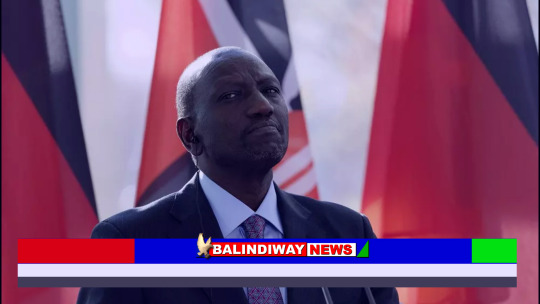
View On WordPress
#Balindiway Media#Breaking news#Breaking news in Kenya#Kenya latest news#kenyan news#Nairobians#tuko news#William Ruto
0 notes
Text
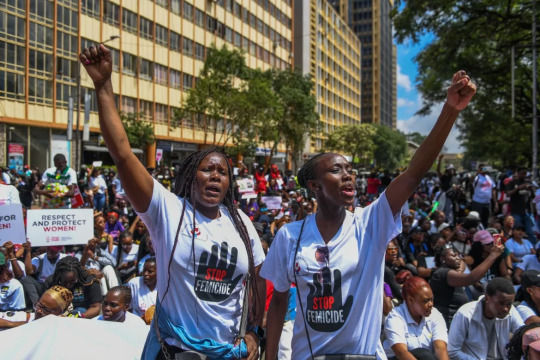
Thousands protest against increasing violence against women in Kenya as they march to the parliamentary building and supreme court in the capital Nairobi [Gerald Anderson/Anadolu Agency]
Published On 27 Jan 202427 Jan 2024
Thousands of people have gathered to protest in cities and towns in Kenya against the recent slayings of more than a dozen women.
The anti-femicide demonstration on Saturday was the largest event ever held in the country against sexual and gender-based violence.
In the capital, Nairobi, protesters wore T-shirts printed with the names of women who became homicide victims this month. The crowd, composed mostly of women, brought traffic to a standstill.
“Stop killing us!” the demonstrators shouted as they waved signs with messages such as “There is no justification to kill women.”
The crowd in Nairobi was hostile to attempts by the parliamentary representative for women, Esther Passaris, to address them. Accusing Passaris of remaining silent during the latest wave of killings, protesters shouted her down with chants of “Where were you?” and “Go home!”
“A country is judged by not how well it treats its rich people, but how well it takes care of the weak and vulnerable,” said Law Society of Kenya President Eric Theuri, who was among the demonstrators.
Kenyan media outlets have reported the slayings of at least 14 women since the start of the year, according to Patricia Andago, a data journalist at media and research firm Odipo Dev who also took part in the march.
Odipo Dev reported this week that news accounts showed at least 500 women were killed in acts of femicide from January 2016 to December 2023. Many more cases go unreported, Andago said.
Two cases that gripped Kenya this month involved two women who were killed at Airbnb accommodations. The second victim was a university student who was dismembered and decapitated after she reportedly was kidnapped for ransom.
Theuri said cases of gender-based violence take too long to be heard in Kenyan court, which he thinks emboldens perpetrators to commit crimes against women.
“As we speak right now, we have a shortage of about 100 judges. We have a shortage of 200 magistrates and adjudicators, and so that means that the wheel of justice grinds slowly as a result of inadequate provisions of resources,” he said.
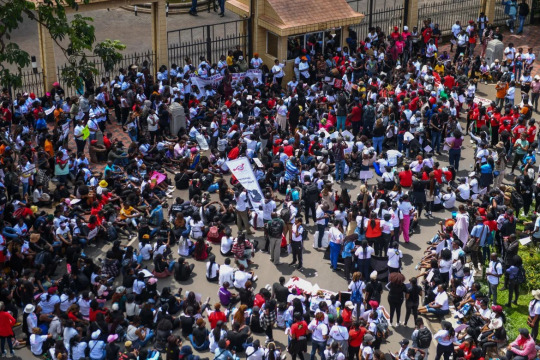
People gather to protest in an anti-femicide demonstration, the largest event of its kind ever held in Kenya. [Gerald Anderson/Anadolu Agency]
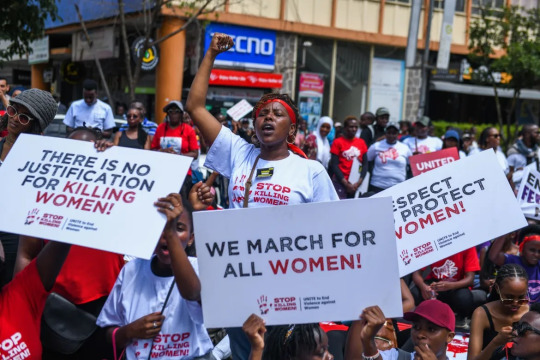
Kenyan media outlets have reported the slayings of at least 14 women since the start of the year. [Gerald Anderson/Anadolu Agency]
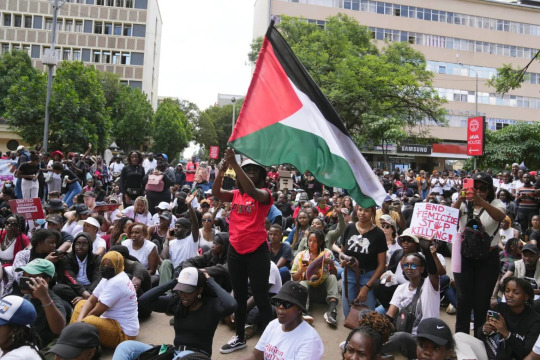
A protester holds a Palestinian flag during a march to protest against the rising cases of femicide, in downtown Nairobi. [Brian Inganga/AP Photo]
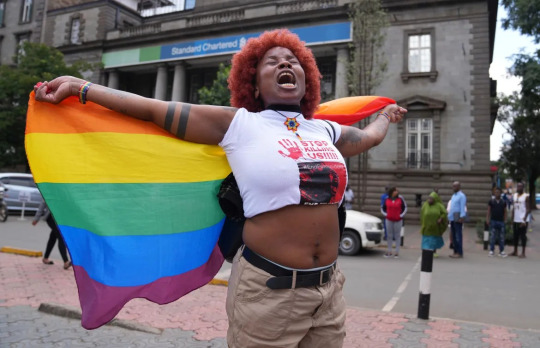
Women and feminists in Kenya took to the streets to march against the rising cases of femicide. [Brian Inganga/AP Photo]

In Nairobi, protesters wore T-shirts printed with the names of women who became homicide victims this month. [Gerald Anderson/Anadolu Agency]
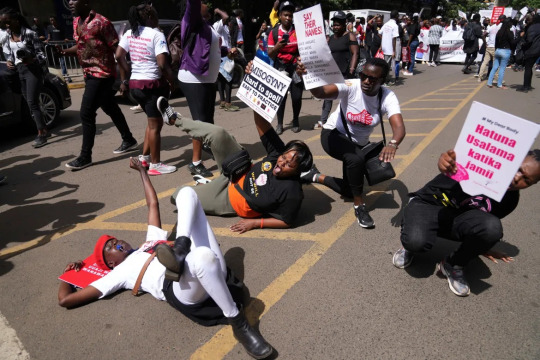
Protesters react against the rising cases of femicide. [Brian Inganga/AP Photo]
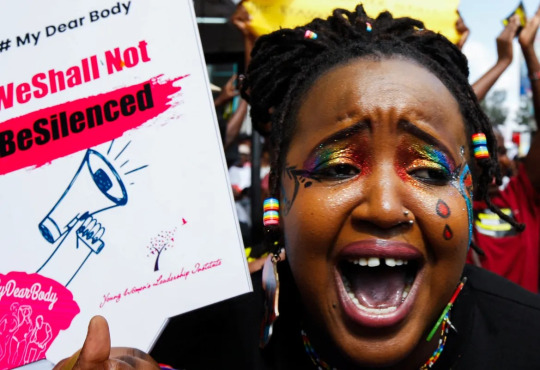
A human rights activist reacts as she attends a protest demanding an end to femicide in the country. [Monicah Mwangi/Reuters]

Protesters gather during the anti-femicide demonstration. [Gerald Anderson/Anadolu Agency]

The crowd, composed mostly of women, brought traffic to a standstill. [Gerald Anderson/Anadolu Agency]
#Kenya#Femicide#Nairobi#There is no justification to kill women#The court systems taking too long to hold perpetrators accountable#The power of women standing together#Please reblog#Western media isn't going to give this the coverage this deserves
1K notes
·
View notes
Text
KenTrade Boost Kenya’s Trade Data Collection with new Business Intelligence Tool
It has been highlighted that big data and economic globalisation are now important factors in trade. Business models that rely on import and export trade are becoming more prevalent. The Business Intelligence (BI) Tool was purchased by Kenya's trade network agency, KenTrade, for Sh90 million in an effort to gather large data on the country's import and export commerce.

#kentrade#kenya'strade#kenya trade data#business intelligence tool#kenya import and export#kenya trade latest#kenyan economy#kenya exim news update
0 notes
Text

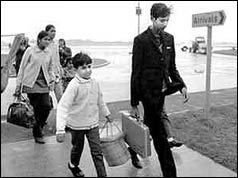
On 18th September 1972, BBC News reported that the first 193 Ugandan refugees, fleeing persecution by the country’s military dictatorship, had arrived at Stansted Airport, Essex. Over half of the arrivals had British passports, and housing and immediate needs would be overseen by the Ugandan Resettlement Board.
Uganda’s Asian community, numbering around 55 000, many of whom ran family businesses and small enterprise, were ordered in August 1972 to leave the country within 90 days by President Idi Amin. Amin had publicly denounced Ugandan Asians as ‘bloodsuckers’, threatening that any who had not left by the arbitrary deadline of November 8th would be interned in military detention camps.
Many of the initial flight of refugees had endured frightening experiences prior to their departure from Uganda, at the hands of Amin’s troops. "On the way to the airport the coach was stopped by troops seven times, and we were all held at gun point," one refugee told reporters. Another stated that he had been robbed of personal valuables and Ugandan currency on the way to Entebbe airport.
News reports at the time cited some opposition within the UK over the acceptance of the Ugandan Asians. The Leicester local authority mounted a newspaper campaign urging refugees not to come to their region seeking jobs and housing. The BBC asserted that, in hindsight, the resettlement programme was seen as ‘a success story for British Immigration’.
The loss of the hardworking and successful Ugandan Asian community devastated Uganda’s agriculture, manufacturing and commerce. Idi Amin was deposed in 1979 and died in Jeddah in 2003, having been responsible for the deaths of as many as 300 000 Ugandan civilians during his reign of terror as President. In 1991, Ugandan President Yoweri Museveni invited the expelled community to return home to help rebuild the economy.
The Wilson Labour government also had to grapple with a refugee crisis from a former African colony.
In February 1968, BBC news reported;
"…Another 96 Indians and Pakistanis from Kenya have arrived in Britain, the latest in a growing exodus of Kenyan Asians fleeing from laws which prevent them making a living…"
Many Asian people living in Kenya had not taken up Kenyan citizenship following the country’s independence from Britain in 1963, but possessed British passports. Under Kenya’s Africanisation policy, non-citizens required work permits, and were being removed from employment in favour of Kenyan nationals. There was growing public demand for laws to prevent non-citizens from owning businesses or even operating as street and market traders. As a result, British passport holders were leaving Kenya at the rate of 1000 per month, leaving a huge deficit in skills and experience within the business community and civil service.
Fearing a backlash over the large numbers of Asian immigrants, Home Secretary, and future Prime Minister, James Callaghan, rushed through the Commonwealth Immigration Act, which made it a requirement that prospective immigrants must have a 'close connection' with Britain.

This led to disagreement in Cabinet, with Secretary of State for Commonwealth Affairs, George Thomson (1921-2008) arguing;
"…To pass such legislation would be wrong in principle, clearly discrimination on the grounds of colour, and contrary to everything we stand for…"
In 1971, the Heath government made further legislative changes that would mean that (some) immigrants from Commonwealth countries would be treated no more favourably than those from the rest of the world, and that tightened restrictions on those who stayed by linking work permits to a specific job and location, requiring registration with police, and reapplication to stay in Britain each 12 months.
The Patrial Right of Abode lifted all restrictions on those immigrants with a direct ancestral connection with Britain.

Home Secretary Reginald Maudling (later famous for being smacked in the face by Irish MP Bernadette Devlin, and for having to resign over a corruption scandal linked with disgraced property developer John Poulson) denied that this was, in effect, a 'colour bar', telling the BBC;
"…Of course they are more likely to be white because we have on the whole more whites than coloureds in this country, but there is no colour bar involved…"
Unsurprisingly, not everyone was convinced.
Vishna Sharma, Executive Secretary of the Joint Council for the Welfare of Immigrants, described the bill to BBC News as, "basically racially discriminatory, repressive and divisive," and added, "It will create divisions amongst the Commonwealth citizens already living in this country on patrial and non-patrial basis. It will create day-to-day bureaucracy and interference on people living in this country. It will create more hardship for people wanting to enter into this country."

(Source; BBC reporting and history.com. Photo Credits; BBC News)
#social history#uk politics#working class history#social justice#uk government#human rights#uk history#british culture#society#history#race relations#immigration
26 notes
·
View notes
Note
okay jikook is definitely real and all i can’t argue with that
but why do they drink so much when they’re together? i understand they’re often awake until like 4AM and they both love alcohol, so obviously they’re bound to drink when they’re together
but it’s just…ALL THE TIME. whenever we get news (more like confirmation) that they spent time together the night before, there’s always drinking involved. them asking each other who smelled like alcohol (whether they were joking or not) in the latest bangtan bomb just means they drank a lot. again.
i go partying and clubbing a LOT and i’m a year younger than jk. i don’t think it’s a case of me tryna mom over them. we’re just made aware of a quarter of the time they spend together. and even then, it almost always involves alcohol so what more off cam?
i guess i’m just extra concerned about them now, especially after news about an idol’s death.

Okay, we seriously need to talk about this. Okay take for example, I am Kenyan and we drink, ALOT. It's part of my culture. I can finish 10 beers and still be fine while my Scottish partner drinks 2 beers and he's already falling asleep. I can finish 2 bottles of wine while my UK friend drinks a glass and half and suddenly she's seeing double. Cultural differences are important anon and they are things Armys need to start considering when it comes to BTS. I wouldn't treat my American friend the same way I will treat my Russian or my Polish friend. I have a Polish ex who used to finish a bottle of Vodka, fucking vodka by himself. And no he wasn't an alcoholic, they just drink alot over there.
Koreans are heavy drinkers. It's part of their culture and they have such high tolerance. If I ever met BTS I want to have a drink with Suga so I can see who between us will pass out first coz that man can drink 😂😂 but I don't see no one giving him shit for it. Just JK. People on YouTube calling Jimin an alcoholic, why? Do you know he's not even the member who drinks the most? Just because he likes to down his drink and others prefer to pace themselves, doesn't make him the biggest drinker among the Tannies. Did u see Jin in BV Malta? And this man still woke up the next day looking fresh as a fucking daisy, after MIXING drinks all night. You have to be pretty bad ass to mix your liquor and still be okay the next day. Even i can't do that!
Jikook don't have a drinking problem. You, the one judging them, you are the problem. Cultural differences people. Let's try n remember this please!
I could send u links about Koreans and drinking but I think this one should be easy enough to find on YouTube or Google. Please look into it and erase this mentality 💜
16 notes
·
View notes
Text
How to fall in love via Deneuve Magazine Personal Ads Circa 1993
❖ Go to your mailbox and see that your latest issue of Deneuve magazine has been delivered. It’s in a plain brown envelope, but you still take it all the way inside the house before you open it.
❖ Take a moment to gaze at the cover and appreciate the fact that it’s named after Catherine Deneuve in honor of her sex scene from The Hunger which awakened us all.
❖ Flip past the first few pages of ads. Do I want to fax away for a brochure about the chance to go on a Kenyan photo safari with the world’s first out lesbian commedienne? What about the Olivia Thanksgiving cruise?
❖ Enjoy the Editor’s Column about how our new President Clinton has pledged to make real progress for the LGBT community. Bask in the warm glow of happiness knowing that the gay dark ages are finally coming to a close.
❖ Chuckle at Alison Bechdel’s ad for the Feminist Bookstore Network and wish you had one of those stores near you.
❖ Keep up with the state of the lesbian nation via the letters to the editor. Aren’t the repressive laws being passed in Oregon and Colorado shocking? Goddess bless that Kentucky baby dyke having to dodge the KKK at her high school 🙁
❖ Read the wedding announcements and get all choked up, remembering why you’re here. Resist the urge to flip to the end and see if there’s anyone new from last month. Hope springs eternal!
❖ Oh, the 20th anniversary of Naiad Press! I love their stuff! Especially how all the covers look like they’re printed with ink that was on sale. I wonder if they have any more copies of that Lesbian Queries book from 1990???
❖ Audre Lorde sure is gonna give them hell at the march on Washington, eh?
❖ So many bookstores. So many books.
❖ An article about Safe Sex! Hell yes! Even though lesbians don’t get AIDS because we’re God’s chosen people, this will be fun to read about in theory! “After all, aren’t we told that lesbians and priests are in the lowest risk category?” lol people thought priests weren’t constantly having gay sex. Simpler times.
❖ An interview with Alison Bechdel! She’s so swoony.
❖ Articles about soap operas, speculation about Hilary Clinton, gossip about Madonna and Sandra Bernhard. And what about Whoopi Goldberg? And that Ellen lady? She’s been on Arsenio Hall acting all cagy about the men in her life. A list of women we wish were gay, including Joan Jett? Didn’t she sing Crimson and Clover without changing pronouns like waaaaay back in the 80s
❖ Music reviews: Sweet Honey in the Rock and Alix Dobkin! We’re almost to the ads…
❖ Labrys jewelry, freedom rings. C’mon, let’s get to the good stuff!
❖ Here we go! Classified ads– 30 words for $20! Queer personal finance, we buy used computers, a lesbian resort in New Hampshire.
❖ Personals at last! Is my woman here?
❖ Hey there’s that woman who has an ad every month expressing her ‘complete and sincere respect for’ women in military, fire, police, private security, corrections’. A gay male ad would say ‘Uniform fetish’ but apparently we’re too delicate.
❖ Bisexual boston babe ‘femalely handsome’ looking for someone who’s ‘nice to look at, not a feminist and not a bitch’. Next!
❖ Lonesome in Wyoming, Bisexual Bodybuilder, Softball is over, time to find someone warm for winter, Reubenesque Arkansas Buddhist…
❖ Find a girl who sounds promising– seems interesting and is not too far away. Spend a day or so composing a letter with a pen and piece of paper introducing yourself. If you don’t have a photo of yourself that you like, have a friend take one. Then finish the roll of film and bring it to the Fotomat and wait a day or so and then pick up the prints and hope you like one of them. Choose one anyway, and put it in the envelope with your letter.
❖ Get a stamp, hang it on the mailbox, never hear anything ever again.
❖ One month later, go to your mailbox and see that your copy of Deneuve has arrived.
#lesbian queries#lesbian query of the day#Deneuve magazine#personal ads#lesbian love#lesbian sex#yay lesbians
3 notes
·
View notes
Text
The plight of Kenya's jobless youth: A story of hope and despair.
By Emmanuel Okiru, 17 November 2023
Kenya is facing a serious challenge of youth unemployment, which affects millions of young people who are either out of work or stuck in low-quality and informal jobs. According to the World Bank, the youth unemployment rate in Kenya was 13.35 percent in 2022, among the highest in the world. The situation is worse in urban areas, where the youth unemployment rate was 19.1 percent in 2009, the latest year for which data is available.
The causes of youth unemployment are complex and multifaceted, ranging from a slow-growing economy, a mismatch between the skills of the labor force and the demands of the market, a lack of access to capital and credit, and a high population growth rate that outstrips the creation of new jobs. Moreover, the COVID-19 pandemic has exaggerated the problem, as many businesses have closed down or reduced their operations, leading to massive layoffs and income losses.
However, despite all these, there are also stories of hope and resilience among the Kenyan youth who are trying to overcome the barriers and create opportunities for themselves and others. Some of them have benefited from various initiatives and programs that aim to provide them with skills, training, mentorship and funding to start and grow their own businesses or find decent employment.
One such program is the Youth Enterprise Development Fund (YEDF), which was established by the government in 2006 to support youth entrepreneurship and innovation. The fund offers loans, grants and business development services to youth groups and individuals who have viable business ideas or existing enterprises. According to the fund's website, over 12 billion Kenyan shillings has been disbursed to more than 1.4 million youth since its inception.
One of the beneficiaries of the YEDF is Mary Wanjiku, a 24-year-old who runs a poultry farm in Kiambu County. She started her business in 2019 with 100 chicks, after receiving a loan of 50,000 shillings from the fund. She has since expanded her farm to 500 birds and sells eggs and chicken to local hotels and supermarkets. She has also employed two other young people to help her with the daily operations.
"I am very grateful to the YEDF for giving me this opportunity to start and grow my business. It has changed my life and given me a sense of purpose and dignity. I am able to support myself and my family, and also create jobs for other youth in my community," this is what she had to say in an interview with the Kenyan disclosure team.
This is just an example of how some Kenyan youth are coping with the challenge of unemployment and how some programs are trying to address it. However, there is still a lot that needs to be done to create more and better opportunities for the millions of young people who are still struggling to find their place in the society and the economy.
YEDF Testimonial video. Source: https://m.facebook.com/StateHouseKenya/videos/short-video-youth-enterprise-development-fund-yedf-beneficiaries/891250118940038/?locale=ms_MY
Photo gallery depicting the state of Unemployment in Kenya.
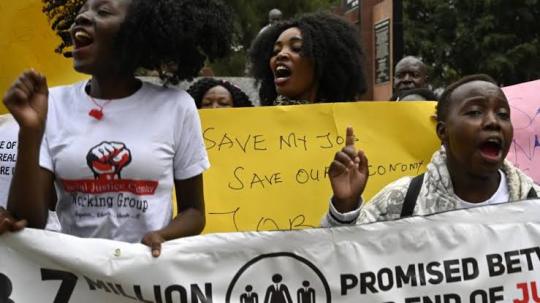
Kenyan youth protesting over increased unemployment. Source; Business Daily Newspaper, 2020.
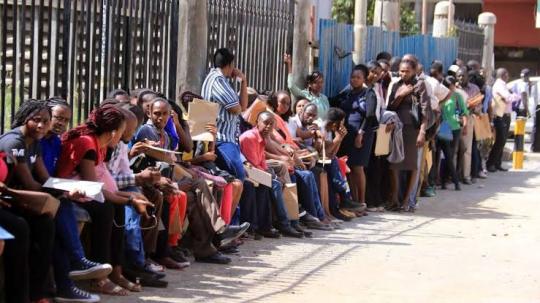
Jobseekers wait to hand in their documents during recruitment at County Hall in Nairobi
Source; Nation Media Group, 2019.
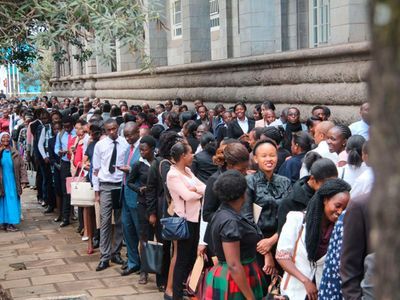
Job seekers queuing for interviews in Nairobi. Source; The East African Newspaper.
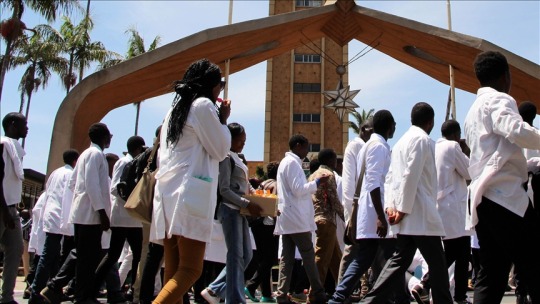
Kenyan doctors protest against unemployment. Source; https://www.aa.com.tr
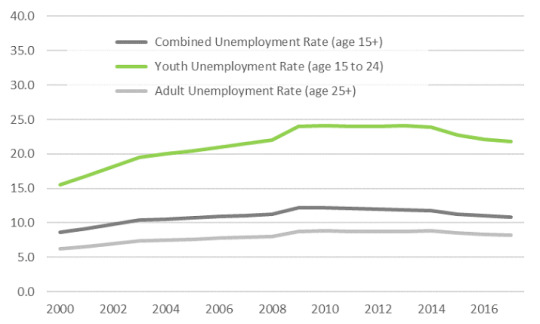
Unemployment rate in Kenya over the years.
The graphs below give a clear depiction of Kenya's state of employment over the years;
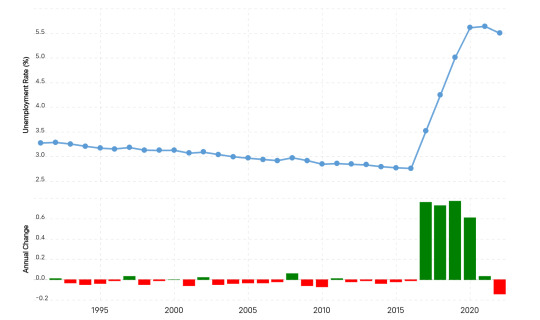
Source: <a href='https://www.macrotrends.net/countries/KEN/kenya/unemployment-rate'>Source</a>
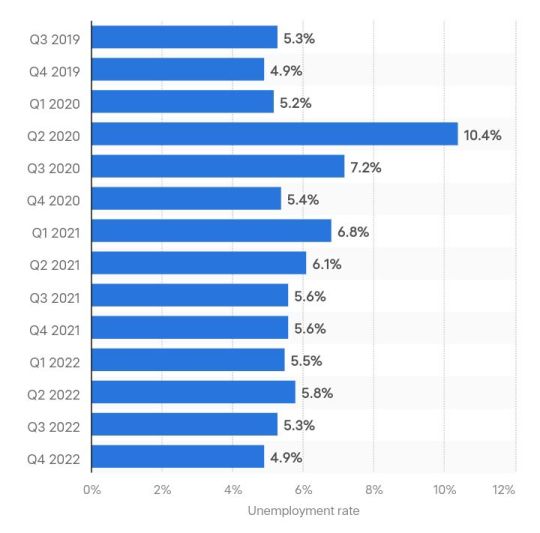
Unemployment rate in Kenya from Q3 2019 to Q4 2022. Source; https://www.statista.com/statistics/1134370/unemployment-rate-in-kenya/
2 notes
·
View notes
Text
MrBeast’s Philanthropic Effort Draws Unexpected Backlash for Constructing 100 Wells in Africa to Supply Clean Water Because He is “White” (VIDEO)

youtube
The best thing that could happen to Africa is for them to be recolonized.
The well-known philanthropist and YouTube giant, MrBeast, has encountered a wave of criticism after his latest project in Africa.
Jimmy Donaldson, popularly known as MrBeast, faces a fresh wave of scrutiny following the release of his new video showcasing the funding and construction of 100 wells across various African nations. The digital philanthropist anticipated backlash, stating he expects to “get canceled” for his charitable actions, which have historically drawn fire.
MrBeast, who has previously faced labels such as “white savior” and been called “demonic” for his humanitarian content, has now been accused of overshadowing the efforts of local governments and international organizations. His initiative, stretching across Cameroon, Kenya, Somalia, Uganda, and Zimbabwe, will provide clean drinking water to approximately 500,000 people.
The wells were constructed in villages and schools across Africa and were created using giant drills to access pure water sources underground.
In addition to the wells, MrBeast’s video features donations of educational supplies to Kenyan schools and the construction of a bridge to facilitate community access to medical facilities and educational institutions.
Even Costco Is Now Selling Gold Bars – But How Do You Buy Gold if Your Money Is Wrapped up in a Retirement Account?
Despite the tangible benefits of these projects, the social media star has been met with mixed reactions.
“I already know I’m gonna get canceled because I uploaded a video helping people, and to be 100% clear, I don’t care. I’m always going to use my channel to help people and try to inspire my audience to do the same,” the social media star wrote.
Taylor Lorenz, a far-left reporter, addressed the concept of monetizing kindness, suggesting that the YouTube star’s approach could be perceived as exploitative.
“No one is “cancelling” you for “helping people”, you’ve received extremely light criticism in the past for the way you’ve monetized “kindness” content that some vulnerable people found to be exploitative,” said Lorenz.
“Encouraging young people to exploit vulnerable communities for content which they can then profit off of enormously, is the issue,” Lorenz added.
No one is “cancelling” you for “helping people”, you’ve received extremely light criticism in the past for the way you’ve monetized “kindness” content that some vulnerable people found to be exploitative.
Meanwhile, Albert Nat Hyde, a Twitter activist, rebuffed the idea of Africans needing water donations, criticizing what he views as a capitalist agenda beneath the guise of charity. He also added that the word “wells” is offensive.
“Wells in 2023 is offensive; why not boreholes or pipe-borne water? – Africans do not need water donation; we ain’t that poor and thirsty. – Africa is a continent with 54 countries; he must be specific where he went – This is capitalism; he wanna low-key use these countries for profit – He has set Africans for global ridicule by building wells we never asked him for,” Hyde wrote.
Mr Beast 100 wells is disrespect to Africans
– He described the entire Africa as a village with its people living in huts
– He projected that all Africans lack good drinking water
– Wells in 2023 is offensive; why not boreholes or pipe-borne water?
– Africans do not need water… pic.twitter.com/X8k12kvdp3
— Albert Nat Hyde (@BongoIdeas) November 5, 2023
Francis Gaitho, a Kenyan political activist, argued against what he perceives as a perpetuation of African stereotypes, accusing MrBeast of reinforcing the narrative of African poverty for content views. Gaitho emphasized the continent’s desire to move beyond philanthropy that serves external interests over genuine developmental progress.
“America is part of the problem,” said Gaitho, adding, “And you, Mr. Beast, are not supposed to be coming here to validate some of these long-held stereotypes that Africa is poor.”
MR BEAST IN KENYA
Content creator #mrbeast was in Kenya drilling boreholes in 100 schools across the country.
Also there’s a bishop from Naivasha called Abiud Masinde who has been accused by an American benefactor of stealing donor money meant to build a school. pic.twitter.com/QdZCwOamoy
— Francis Gaitho (@FGaitho237) November 5, 2023
Saran Kaba Jones, the founder of FACE Africa, also weighed in, expressing the challenges of sustaining such humanitarian projects. She acknowledges the frustrations of seeing a well-resourced figure like MrBeast, a “white male,” garner immediate attention.
“I’ve been doing this for 15 years, but we’ve been struggling to continue the work because funding, awareness, and advocacy all take work,” Jones told CNN, adding, “overnight, this person comes along, who happens to be a white male figure with a huge platform, and all of a sudden, he gets all of the attention. It’s kind of frustrating, but it’s also understanding the nature of how the world is.”
2 notes
·
View notes
Photo



Peter Beard, Self-portrait, Bristol hotel mirror, found in Francis Bacon's studio, 1975.
Peter Beard was 27 years old when he made his name as a photographer and ecologist with the publication of The End of the Game (1965), a searing photo essay on the mass deaths of African elephants from overcrowding in Kenyan game reserves, and an incisive historical analysis of the dangers of man’s booming population living too closely together with Africa’s great fauna. Forty productive years later, Beard and his third wife, Nejma Khanum, published an art edition of Peter Beard (2006) a large-format compendium of his work as photographer, diarist and collagist. The latest trade edition (in English, German and French) appears, poignantly enough, just a month after Beard, who had been suffering from dementia, went missing near his home at Montauk, Long Island, and was found dead nearly three weeks later.
The book, weighing in at nearly 800 pages and more than 5kg, is a rich, multi-layered visual autobiography of a life lived between Kenya, New York and Montauk, in cahoots with a creative in-crowd that included Francis Bacon, Andy Warhol, Salvador Dalí, Mick Jagger, and Jackie Kennedy. The narrative is told through a lifetime’s personal photographs, selections from Beard’s highly worked diaries, and his large-format collages. In his diaries he often combined text, photography (often with overlaid calligraphy), drawing, blood and newspaper cuttings—Warhol called them Beard's “trip books”. In this extract, Beard recounts to his former publisher Steven ML Aronson his first meeting with Francis Bacon in March 1967 at the opening of the artist’s exhibition at Marlborough Fine Art.
https://www.theartnewspaper.com/.../extract-or-the-late...
12 notes
·
View notes
Text
Kenyan authorities were wrong to ban the gay community from registering a rights organisation, the country's Supreme Court has ruled.
Yet at the same time it stressed that gay sex remains illegal.
The judges ruled three-to-two that the country's NGO board was wrong to stop the National Gay and Lesbian Human Rights Commission (NGLHRC) from registering in 2013.
As Kenya's highest court, the Supreme Court's ruling cannot be overturned.
In their judgment, the judges ruled that "it would be unconstitutional to limit the right to associate, through denial of registration of an association, purely on the basis of the sexual orientation of the applicants".
Nevertheless, the ruling is bitter-sweet for Kenya's gay community. Laws which were introduced under British colonial rule mean that it is criminal to have sex that "is against the order of nature", which can result in up to 14 years in prison.
In May 2019, Kenya's high court rejected an attempt to overturn these laws.
Africa Live: Latest update from around the continent
'Why our fight for gay rights in Kenya isn't over'
Where it's illegal to be gay
Friday's judgement ends a 10-year legal battle which began in 2013 when Eric Gitari, the former executive director of the NGLHRC, challenged the head of Kenya NGO Coordination Board's refusal to permit him to apply to register an NGO under a name containing the words gay or lesbian.
The judges ruled in his favour at the High Court in 2015, again at the Court of Appeal in 2019 and finally in 2023.
Speaking after the ruling, Njeri Gateru, the current executive director of the NGLHRC, said: "The Supreme Court's decision to uphold the lower courts' rulings is a triumph for justice and human rights.
"At a time where the Kenyan LGBTIQ+ community is decrying the increased targeting and violence; this decision affirms the spirit and intention of the Constitution to protect all Kenyans and guarantee their rights."
The ruling comes at a time when homophobic rhetoric has been rising in Kenya.
Members of the LGBTQI+ community have been harassed by police, subjected to body examinations to "prove" gay sex, and openly insulted on social media and in public spaces. Some say they have even been denied healthcare and thrown out of rental houses for being gay.
On the day of the judgement, Member of Parliament George Peter Kaluma filed an official notice that he intended to introduce a bill which would jail for life people convicted of homosexuality or the promotion of it.
While Friday's Supreme Court ruling arguably torpedoes any attempts to legally harass openly gay people with new laws, Mr Kaluma can still rally MPs to increase jail terms for gay sex.
It is also illegal to have gay sex in neighbouring Uganda, where Muslim leaders used Friday prayers to preach against homosexuality.
The head of the country's Muslims, Mufti Sheikh Ramathan Mubajje, called on the authorities to enact even tougher laws against same-sex relations.
He was speaking at the Old Kampala mosque in the capital, Kampala, where hundreds had gathered for Friday prayers.
Earlier in the week, the Uganda Muslim Supreme Council circulated a letter to all clerics under its association gazetting Friday as the day to carry out peaceful protests against homosexuality in Uganda.
The clerics were asked to prepare sermons condemning same-sex relations and extend the same message to the media and schools.
In the event, the protests were only held in the eastern city of Jinja.
Gay rights activist Frank Mugisha described the protests as dangerous, saying they could increase cases of violence against those who identify as LGBT.
There has been a recent surge in homophobic sentiment in the country.
Last week, President Yoweri Museveni said Uganda would not embrace homosexuality and that the West should stop trying to impose its views and "normalise" what he called "deviations".
3 notes
·
View notes
Text
More than 45 people confirmed dead in Mai Mahiu after Kijabe dam burst
Numerous individuals lost their lives following the breach of a dam in the Mai Mahiu region of Kenya, situated north of the capital city Nairobi, as confirmed by the Kenyan Red Cross.
The area’s governor, Susan Kihika, also verified these fatalities to members of the press noting that the count might escalate.
Torrential rains in various parts of the country led to water gushing and carrying…

View On WordPress
#Balindiway Media#Breaking news#Daily nation#Kenya latest news#kenyan news#Nairobians#tuko#tuko news#William Ruto
0 notes
Text
It was never “women were trading sex for fish” it was “men were exploiting hungry women with hungry children”.
At least there is a happy ending to this story.

When an NPR team met Justine Adhiambo Obura in the fall of 2019, she wore a turquoise t-shirt with a bold message: "No Sex for Fish."
It wasn't just an eye-catching slogan. It was a summation of the indignities women faced in her world — and how they flipped the power dynamic.
In a number of lakeside communities in Africa and other parts of the world, men do the fishing and women sell the fish. For many of the women, living in poverty and with minimal education and a lack of job opportunities, there was no other way to earn a living, to support their children.
As supplies of fish diminished in various locations, fishermen began demanding sex in exchange for providing a woman with fish to sell. That was the case in Nduru Beach on Lake Victoria, where Obura lives. A lot of the fishermen were HIV positive and infected the women. The women hated this practice of transactional sex but many felt they had no choice. "I exchange sex; I get fish," Mika Onyango, a mother of six, told us. "I don't care about getting HIV. Me, I need fish. I need earning to sustain my family."
In 2011 Obura and others came up with a game-changing idea. What if they owned their own boats – and hired men to fish for them? With the help of a couple of Peace Corps volunteers and a series of grants, they started the No Sex for Fish
cooperative. Eventually, Nduru Beach and eight other area villages got boats – around 30 in total. The women of Nduru Beach not only earned a living but built up a sizeable rainy day fund – some $6,000 – which they donated or loaned to members facing financial stress.
Then came an unprecedented series of rainy days. In early 2020, Lake Victoria rose and flooded Nduru Beach. The 1,000 or so residents fled to safety. They abandoned their homes; many of them had no alternative but to live in improvised shelters at local schools. They had no personal savings – and for the women of No Sex for Fish, no way to make money. These women – some of them single mothers, some of them HIV positive – saw most of their boats lost or damaged beyond repair. The money the group had saved over the years enabled them to weather these dire times.
Some former fishmongers turned to farming. In nearby Kusa Beach, which had a chapter of No Sex for Fish, a tomato project looks promising. Obura and some of the women of Nduru Beach tried agriculture too. It didn't work out for them.
Eventually the waters of the Lake receded and the Nduru Beach women came up with a plan that seemed risky but made sense to them: Let's go back to fishing.
Here's the story of the unexpected revival of No Sex for Fish.
A tall woman walks around a boat as a carpenter slowly seals its sides to block water from seeping in. She is Justine Adhiambo Obura, a founding member of the No Sex for Fish cooperative.
The carpenter is putting the final touches on the boat, which was built with Ugandan hardwood to give it a long life as a fishing vessel on Lake Victoria.
"We are slowly getting our lives and source of livelihoods back," says Obura. "Through our efforts in our group No Sex for Fish, our members are slowly getting back to business."
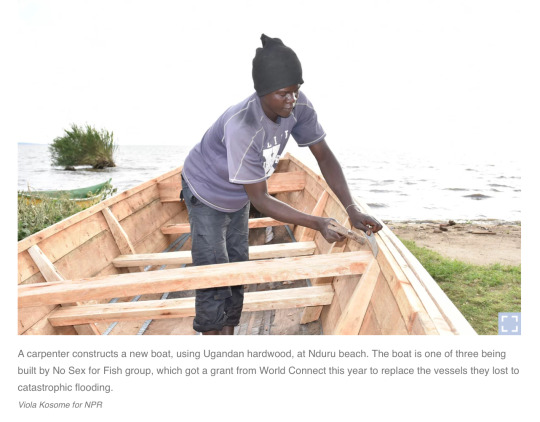
An 'amazing' turn of events
The fact that this boat is being built for the No Sex for Fish group is "surprising," says Tim Kibet of Kenya, a field agent for the charity World Connect. That's the group that funded earlier boats and this summer issued a grant for approximately $8,000 U.S. to build three new boats and buy the voluminous nets needed for fishing.

A year ago, in the wake of the catastrophic flooding, the No Sex for Fish group seemed to have reached an end, he recalls. "Their boats were destroyed, the women were so devastated they didn't know what to do. I'm glad they held onto themselves as a group."
Patrick Higdon of World Connect's London office, who has monitored the grants given to No Sex for Fish, is equally surprised: "It was pretty bleak last year. To see this [fishing] kick back up, we always knew they wanted it and had the perseverance. But it just didn't seem like the conditions were going to allow it."
"They were adamant all along that they needed to get back to fishing," Higdon says. "At the time with the flooding and the homes damaged and all that we had read about the fishing economy and dwindling catch, it was hard to believe — but they were insistent. It's what they know and what they know can be profitable.

Pondering the unlikely turn of events, Higdon says: "It's pretty amazing, it's pretty cool."
Back to the beach
Ten women are part of the revived No Sex for Fish cooperative. They all used to live in Nduru Beach but were displaced by the flooding. The waters have receded. A few people have returned to the village, including the group's treasurer and one other member.
One boat has been completed using the new grant money and is already fishing the lake. The women had salvaged two engines from their previous boats and are using one on this new craft. Fishermen take the vessel out for the night. In the morning, a couple of women from the No Sex for Fish group meet the boat. They take turns because most of them now live outside Nduru Beach and may have to walk for 30 minutes or take a motorcycle taxi to the shore.

On a recent morning in August, two women were cleaning the newly caught fish – Nile perch, catfish, tilapia, tiny silvery fish called omena. They'll sell most of the daily catch but also take fish home to feed their families. The women say they make about $10 a day.
The income helps support their families, with a portion devoted to rebuilding their nest egg for future needs. Since the women resumed fishing in July, they have saved up around $600 — roughly an average monthly salary in Kenya.
The hope is that some of these savings will eventually help flood-displaced members find permanent housing.
There's another ambitious goal: building more boats so their enterprise and income will grow.
Persisting and planning
Of course the lake could rise again. So the group needs a plan to ensure that their new boats survive any future disaster.
They're definitely going low-tech in their solutions. One plan is to nestle the boats in wild papyrus plants when not in use. The towering plants could prevent a boat from being washed away in a flood.
On top of the flooding crisis, the women have faced personal tragedies. Rose Atieno Abongo is grieving the loss of her 26-year-old son, whose body she found outside her home about a month ago. She suspects he was killed by robbers and now must raise her 5 remaining kids without the income he earned as a fisherman.
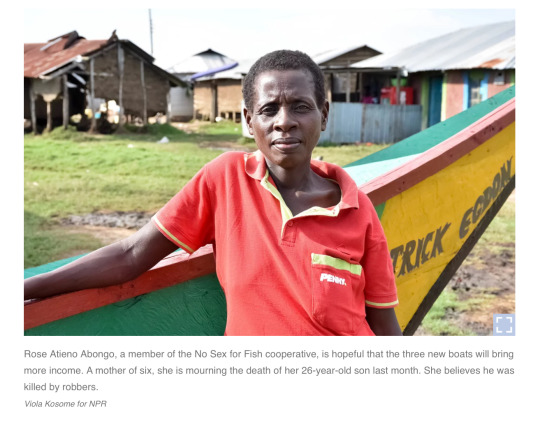
"I used all the money I had for my son's burial and I do not have even small amount of money to continue with my business of selling fish," says Abongo.
But she is still hopeful that life will change for the better. She decided to be part of the No Sex for Fish revival so she can put food on the table for her kids.

Another member, Lorine Otieno Abuto, who is HIV positive, says, "I am just praying that I will get some money to make my own boat like I had before." She dreams of the life she had before, when she was still poor but "I would sell fish from my boat and at least life was not that hard."
Her remark is a reminder that these women lead tough lives — yet somehow found the strength to take charge of their destiny, back in 2011 and now again in 2022.
And for Justine Adhiambo Obura, a mother of 9, including a daughter with development disabilities, the three new boats are a cause for joy in the wake of the fearsome floods. "We feel so good," she says. "We are very happy."
Viola Kosome is a freelance journalist in Kenya.
#No Sex for Fish#Men exploiting women#lake victoria#World Connect#Women and food security#Women impacted by natural disasters#Nduru beach#Kenya
265 notes
·
View notes
Text
In the Netherlands yesterday, a majority in the Dutch Parliament supported a legislative proposal to make menstrual hygiene products free for individuals at or below the national poverty level. The bill is slated to be implemented in 2023.
Dutch legislators in favor of the bill maintain that for eligible persons at or below the poverty level menstrual hygiene products should be “free and easily accessible.” Initially, this is only projected to cost the government around two million euros. The Minister who handles policy issues related to the reduction of poverty, Carola Schouten, has indicated that she eventually wants a comprehensive solution to the problem; namely, making available menstrual hygiene products for free to every person who needs them. Of course, this would raise the costs of the program considerably.
Inadequate access can be “very restrictive, especially for young women,” Minister Schouten said. “If they can no longer afford those products, that could determine whether they can still participate in school and other activities.”
Described as period poverty, for many women having a period can be a substantial financial burden. Worldwide, according to the World Bank, 500 million girls and women experience what is also termed “menstrual poverty.”
Many people who can’t afford menstrual hygiene products wind up using unsafe materials like toilet paper or even rags. This can lead to infections or other health problems.
As a result of deficient access to menstrual products, many also experience learning deficits at school due to absenteeism.
And, there can be a loss of human dignity when a person is unable to afford necessary items every month. Further magnifying the matter is the fact that periods and sanitary protection can be an embarrassing topic for some. Provision of free period products can reduce the stigma.
Kenya was one of the first countries in the world to recognize these issues. In 2004, Kenya repealed its value added tax on feminine hygiene products. And since 2011, the Kenyan government has budgeted approximately $3 million annually to distribute free sanitary pads in schools in low-income communities.
Several other countries followed Kenya’s lead. In New Zealand, for example, Prime Minister Jacinda Ardern announced in February 2021 that all schools in the country would start providing free tampons and sanitary pads by June 2021.
And in August 2022, Scotland became the first country* in the world to codify in law the right to access free period products, such as tampons and sanitary pads. Councils and education providers will be legally required to make period products available free of charge to anyone who needs them.
In practice, Scotland’s Period Products Act implies that all educational institutions and local governments must offer menstrual products free of charge. A BBC report suggests that the program will cost the government around $32 million dollars annually.
In the U.S., about 10 years ago a debate began on the topic of period equity. Advocates argued that local, state, and federal government policies exacerbate inequitable access by imposing sales taxes on menstrual products, not providing free menstrual products in correctional facilities, exempting such products from public health benefits programs like Medicaid, and not making these products uniformly available in schools, institutions of higher education, and shelters.
And so, starting at the local level there have been numerous initiatives on “period equity.” In 2013, Nancy Kramer founded a group called “Free the Tampons,” which promotes the idea of “freely-accessible tampons and pads in all restrooms outside of the home.”
Leave it to New York City – often ahead of the curve in the U.S. on so many social issues – to be the first large city, in 2016, to have instituted an an extensive program to ensure access to menstrual products in public schools, shelters, and correctional facilities.
At the state level, there’s recently been a concerted effort to facilitate and improve access. In 2021, proposed legislation related to period equity was introduced in 37 states, according to Women's Voices For The Earth, a nonprofit advocacy group. But only six states currently require all schools and places of learning, prisons, and shelters to provide free menstrual products.
The latest state to implement a far-reaching bill is Washington. Former Governor, Jay Inslee, signed the legislation into law in May 2021, mandating that all public schools, colleges, and universities make free menstrual products available to all genders starting in the 2022-23 school year.
Of course, for the most encompassing changes nationwide federal action is needed. In 2021, Representative Grace Meng (D-NY) and dozens of her colleagues introduced a bill called Menstrual Equity For All Act, which would “increase the availability and affordability of menstrual products for individuals with limited access” in schools, institutions of higher education, prisons, and shelters. The proposed legislation states that “period poverty exacerbates the vicious cycle of poverty by further marginalizing individuals who menstruate, causing them to withdraw from daily life, forego pay, or miss educational opportunities.” The very latest action on the proposal is that in November it was referred to the Subcommittee on Crime, Terrorism, and Homeland Security. Why the bill was referred to this committee and not one that is health-related is anyone’s guess.
If left solely to market forces - with attendant tiering and inequality - menstrual conditions may continue to go marginalized and misunderstood. Besides, women’s health, and even their education, may suffer.
The Dutch Parliament’s move to provide widely available, free access to menstrual hygiene products to those on low incomes is the most recent attempt to address period equity. The question is whether this movement to “free the tampon,” if you will, expands beyond Kenya, Scotland, New Zealand, and now the Netherlands. There appears to be some momentum in the U.S. in this regard, especially at the local and state levels.
3 notes
·
View notes
Text
Thursday, May 23, 2024
US Hostages
(Atavist) You’re on a work trip in a faraway country when men with guns suddenly appear and spirit you into a windowless black van. They blindfold you. They tell you to keep quiet. Your mind races as you attempt to make sense of a situation that defies logic. Where am I going? Why is this happening? What do they want? Will I ever see my family again? Between 2012 and 2022, an average of 34 U.S. hostages were being held somewhere overseas. Often, the perpetrators are terrorist organizations; for example, Hamas is presently holding five U.S. nationals somewhere in Gaza. But foreign governments are increasingly the bad actors, targeting businesspeople, aid workers and journalists.
It’s so hot in Mexico that howler monkeys are falling dead from the trees
(AP) It’s so hot in Mexico that howler monkeys are falling dead from the trees. At least 138 of the midsize primates, who are known for their roaring vocal calls, were found dead in the Gulf Coast state of Tabasco since May 16, according to the Biodiversity Conservation of The Usumacinta group. Others were rescued by residents, including five that were rushed to a local veterinarian who battled to save them. While Mexico’s brutal heat wave has been linked to the deaths of at least 26 people since March, veterinarians and rescuers say it has killed dozens and perhaps hundreds of howler monkeys. Around a third of the country saw highs of 45 degrees Celsius (113 degrees Fahrenheit) on Tuesday.
Kenyan Officers in Haiti
(1440) Kenya will begin to deploy police officers to Haiti to lead a UN-authorized multinational mission to quell gang violence. The officers—some of whom have experience fighting Islamist insurgent groups near Somalia—will constitute 1,000 of the 2,500-person security force that is largely financed by the US. More than 1,500 people have been killed in Haiti so far this year, and hundreds of thousands have fled as gangs control 80% of the capital of Port-au-Prince. One of them—the Crips-inspired 5 Segonn—is among the country’s leading cocaine traffickers, with ties to the 2021 assassination of Haiti’s then-president. Kenya’s decision to deploy officers comes after a series of court-ordered delays and as Haiti’s main airport reopened for the first time in three months. In addition to Kenya, a number of countries have offered personnel for the mission, including the Bahamas, Bangladesh, Barbados, Belize, Benin, Chad, and Jamaica.
China’s Steel Spurs Latin America Toward Tariffs
(Bloomberg) Latin American nations are following in the footsteps of the US and Europe by imposing prohibitive tariffs on Chinese imports—a new strain in what’s been an otherwise cozy connection. Mexico, Chile and Brazil have hiked—and in some cases more than doubled—duties on steel products from China over the past several weeks, and Colombia may be next. The turn toward protectionism is spurred by a flood of Chinese imports that threatens to put Latin American steel producers out of business and risk a combined 1.4 million jobs.
Harsh words
(Foreign Policy) Spanish Prime Minister Pedro Sánchez indefinitely recalled Madrid’s ambassador to Argentina on Tuesday after Argentine President Javier Milei accused Sánchez’s wife, Begoña Gómez, of being “corrupt.” “There is no precedent for a head of state who goes to another country’s capital to insult its institutions and flagrantly interfere in its internal affairs,” Spanish Foreign Minister José Manuel Albares said. Milei’s comments alluded to a judicial investigation into Gómez that Sánchez argues is a right-wing smear campaign. Last month, Sánchez considered resigning over the controversy. Following Sánchez’s recall, Milei said the Spanish leader has an “inferiority complex” and should seek out “a psychologist for him to mature.” This week’s comments were just the latest insults that Argentina’s far-right president has thrown at foreign leaders in recent months. In March, Milei called Mexican President Andrés Manuel López Obrador “ignorant,” and he accused Colombian President Gustavo Petro of being a “murdering terrorist,” sparking Colombia to expel numerous Argentine diplomats.
Norway, Ireland and Spain say they are recognizing a Palestinian state in a historic move
(AP) Norway, Ireland and Spain said Wednesday they are recognizing a Palestinian state in a historic move that drew condemnation from Israel and jubilation from the Palestinians. Israel immediately ordered back its ambassadors from Norway and Ireland. The formal recognition will be made on May 28. The development is a step toward a long-held Palestinian aspiration that came against the backdrop of international outrage over the civilian death toll and humanitarian crisis in the Gaza Strip following Israel’s offensive there. Several European Union countries have in the past weeks indicated that they plan to make the recognition, arguing a two-state solution is essential for lasting peace in the region. The decision may generate momentum for the recognition of a Palestinian state by other EU countries and could spur further steps at the United Nations, deepening Israel’s isolation.
E.U. sets precedent with plan to use profits from frozen Russian assets
(Washington Post) Since the earliest weeks of Russia’s war in Ukraine, Western allies have debated how to make the Kremlin pay. On Tuesday, the European Union made a precedent-setting move, formally agreeing to use windfall profits from frozen Russian assets to buy arms for Kyiv. That would amount to about $3 billion in the first year. In the context of the roughly $300 billion in frozen Russian assets, it’s tiny. But it represents an innovative first step as allies figure out how they might use frozen assets without inviting legal challenges or undermining trust in their financial systems.
‘Code 9.2’: The secretive Ukrainian drone unit tasked with dropping mines into Russia
(CNN) Dusk brings an urgent race to hide before dark. The “Code 9.2” drone unit, from the 92nd assault brigade, are moving into a new launch position from where they are about to conduct a rare and potent mission: flying drones into Russia and dropping mines onto key roads inside enemy territory. On the horizon is the Russian city of Belgorod, now repeatedly hit by Ukrainian strikes. In the dark, the team works fast, racing to attach mines to the drone with the help of red light. They finally launch, and the drone drops two packages from its underbelly. The mines sit on the road, and later the next day, the unit says, hit one armored car and a soft skin vehicle. They retrieve the drone and assess the damage the next day. Their target is Russia, a powerful symbol of Kyiv’s decision to take the fight back to Moscow, and the new, dangerous escalatory turns this conflict is taking in its third year.
Indian election casts spotlight on Modi look-alikes
(Reuters) Muslim electric-rickshaw driver Rashid Ahmed is fondly called “Our Modi” in his Delhi neighbourhood for his striking resemblance to Indian Prime Minister Narendra Modi, now seeking a third consecutive term in general elections. Living with his wife, children and grandchildren in a two-room home, Ahmed is a celebrity in the surrounding area, and often interrupted at his daily tasks by visitors who want to meet him or take pictures with him. He is known only as “Modi uncle” to the children there, many of whom he drives to school everyday. Ahmed has also attended rallies of Modi’s Bharatiya Janata Party (BJP) as a prime ministerial look-alike, exciting those in the crowd who initially mistook him for the leader. Such events have earned him about 1,000 rupees ($12) each, about what he gets from his rickshaw driver’s job each day. Ahmed is one of several prime ministerial look-alikes, from a businessman in the financial capital of Mumbai to a food vendor in Modi’s western home state of Gujarat, to have featured in BJP campaigns.
From London to Los Angeles, many Iranians overseas cheer, and fear, after president’s death
(AP) Among Iranian communities from London to Los Angeles, few tears are being shed over the death of President Ebrahim Raisi, killed in a weekend helicopter crash. But there are not always loud cheers, either. While some hope the demise of a powerful figure in Iran’s authoritarian Islamic government may bring change, others fear it could result in more repression. Inside Iran, authorities are keeping a tight lid on reaction to the crash that killed Raisi, Foreign Minister Hossein Amirabdollahian and six others. The government declared five days of mourning, encouraging people into the streets in displays of public grief and support. Prosecutors have warned Iranians against any public celebrations, and a heavy security force presence has been on the streets of Tehran. One female student in Tehran told Reuters that she was not saddened by Raisi’s death “because he ordered the crackdown on women for hijab,” but added, “I am sad because, even with Raisi’s death, this regime will not change.” Outside Iran, some expatriates felt bold enough to dance in the street. The Iranian diaspora is large. More than half a million Iranians live in the U.S.—many in California—and there are large communities in European cities, including London, Paris and Stockholm.
UN halts all food distribution in Rafah after running out of supplies in the southern Gaza city
(AP) The United Nations suspended food distribution in the southern Gaza city of Rafah on Tuesday due to a lack of supplies and an untenable security situation caused by Israel’s expanding military operation. The U.N. warned that humanitarian operations across the territory were nearing collapse. Getting aid to displaced civilians has been hampered by closed and chaotic land crossings, as well as problems plaguing the U.S. military’s new floating pier meant to provide an alternative sea route for aid into Gaza. Over the weekend, hungry Palestinians took aid from a U.N. vehicle convoy coming from the pier, and the U.N. said since then it had been unable to receive trucks there.
Hundreds of hostages, mostly women and children, are rescued from Boko Haram extremists in Nigeria
(AP) Hundreds of hostages, mostly children and women, who were held captive for months or years by Boko Haram extremists in northeastern Nigeria have been rescued from a forest enclave and handed over to authorities, the army said. The army said the 350 hostages were rescued during a dayslong military operation in Sambisa Forest, which was once a bustling forest reserve that stretches along the border with Cameroon and Niger, but now serves as an enclave from where Boko Haram and its breakaway factions carry out attacks that also target people and security forces in neighboring countries.
Like to bike? Your knees will thank you
(NPR) A substantial body of evidence supports the health benefits of cycling, everything from strengthening the immune system to boosting the likelihood of living longer. Now, a new study finds people who are in the habit of riding a bike are significantly less likely to have osteoarthritis and experience pain in their knees by age 65, compared to people who don’t bike. “I was surprised to see how very strong the benefit was,” study author Dr. Grace Lo says, given the profile of the participants. The people enrolled in the study were not competitive athletes, but rather “average” people, ranging from their mid-40’s up to 80 years old. Research also shows biking is good for longevity. “There’s good data to support that people live longer when they bicycle,” says Lo. She points to a study that found people who cycled one hour per week were about 22% less likely to die prematurely.
0 notes
Text
Exploring Nairobi's Vibrant Event Scene with EventsInNairobi.com
Nairobi, Kenya's bustling capital, is renowned for its cultural diversity and vibrant arts scene. For residents and visitors seeking to immerse themselves in the city's dynamic events, EventsInNairobi.com serves as an invaluable resource. This platform offers a comprehensive guide to the myriad of activities happening across Nairobi, from concerts and festivals to workshops and exhibitions.
A Vision for Connection
EventsInNairobi.com was created with a clear mission: to connect people with the exciting events happening around them, fostering a sense of community and cultural enrichment. Nairobi, a city that never sleeps, hosts a plethora of events daily, yet many remain unnoticed. This platform aims to bridge that gap by providing a user-friendly, accessible, and up-to-date resource for all events in the city.
User-Friendly Interface
The website's design prioritizes ease of use. Events are categorized by type, including music, arts, sports, business, and family-friendly activities, allowing users to filter events based on their interests effortlessly. Each listing includes essential details like date, time, location, ticket prices, and a brief description, ensuring that users have all the information they need at their fingertips. Event ratings and reviews further help attendees make informed decisions.
Celebrating Cultural Diversity
Nairobi is a melting pot of cultures, and EventsInNairobi.com reflects this diversity. The platform showcases events that highlight the city's cultural richness, from traditional Kenyan music performances to international film festivals and culinary events. By doing so, it celebrates the unique blend of cultures that make Nairobi vibrant and dynamic.
Supporting Local Talent and Businesses
Promoting local talent and businesses is a cornerstone of EventsInNairobi.com's mission. The platform provides a space for local artists, performers, and event organizers to reach a wider audience, thus contributing to the growth of Nairobi's creative and business sectors. In addition to event listings, the website features interviews and articles about local artists, entrepreneurs, and cultural influencers, offering insights into the creative minds behind the events.
Staying Updated
EventsInNairobi.com ensures users stay informed about the latest events with constantly updated listings. The platform offers a newsletter for weekly updates and maintains an active presence on social media, sharing event highlights, photos, and live updates.
Community Engagement
The platform values user feedback and engagement. Users can rate and review events, providing valuable insights for others. Event organizers and small businesses are encouraged to submit their events, making promotion accessible and straightforward. Additionally, EventsInNairobi.com hosts meetups, networking events, and collaborative projects, fostering a sense of community and collaboration.
Future Prospects
Looking ahead, EventsInNairobi.com is committed to enhancing and expanding its platform. The team is continually exploring new ways to improve user experience, increase event visibility, and support Nairobi's diverse communities. Whether a resident or visitor, anyone can explore Nairobi's exciting events and celebrate the city's vibrant culture through this platform.
In conclusion, EventsInNairobi.com is more than just an event listing site; it is a community hub connecting people to the heart of Nairobi's cultural and social life. Visit EventsInNairobi.com today to discover the pulse of Nairobi's event scene.
0 notes